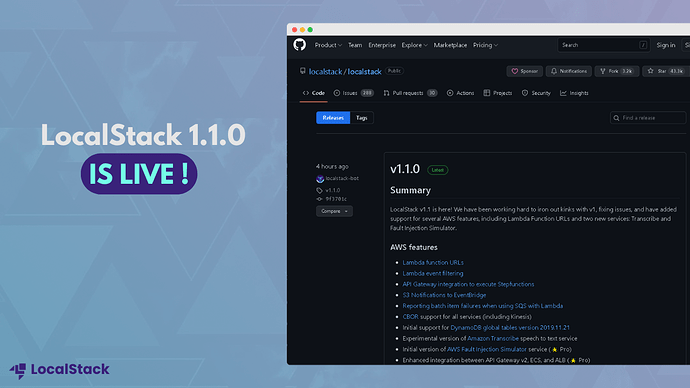We’re excited to share that LocalStack v1.1.0 is now available! The new LocalStack version is our first minor release since LocalStack v1.0. We have added support for several AWS features, including Lambda Function URLs and two new services: Transcribe and Fault Injection Simulator.
Community release
Our Community release features a lot of new enhancements and additions to support our community users:
Lambda Function URLs
AWS recently announced that it had brought Function URL generation support for the AWS Lambda service. With the Function URL property, there is now a new way to call a Lambda Function via HTTP API call. LocalStack now supports Function URLs which folks can use for various cases like backend APIs, webhooks, form validators, micro-services, and others.
We will soon a more detailed blog post showing how you can use Lambda Function URLs with LocalStack!
Lambda Event filtering
AWS Lambda functions provide event-triggers for DynamoDB, SQS, and Kinesis as event sources for event-driven Lambda functions to get invoked only based on the filter expression. At LocalStack, we have added Lambda Event filtering to help you use event filtering to control which events Lambda sends to your function for processing.
For more information about this feature, please refer to the official AWS documentation.
API Gateway integration to execute Stepfunctions
With LocalStack, you can now use API Gateway to associate Step Functions APIs with methods in an API Gateway API. If an HTTPS request is sent to an API method, API Gateway invokes your Step Functions API actions.
For more information about this feature, please refer to the official AWS documentation.
S3 Notifications to EventBridge
You can now use S3 Event Notifications for the serverless event bus service EventBridge with LocalStack. EventBridge developers can benefit from using advanced filtering and routing capabilities to multiple destinations, including Step Functions, Kinesis Firehose, Kinesis Data Streams, and HTTP targets via API Destinations.
For more information about this feature, please refer to the official AWS documentation.
Reporting batch item failures when using SQS with Lambda
LocalStack now enables Lambda to support batch item failures while using SQS. When a Lambda function encounters an error during batch processing, all messages become visible in the queue, including the successful ones. Using LocalStack, you can configure your event source mapping to make only the failed messages visible again.
For more information about this feature, please refer to the official AWS documentation.
Support for AWS Transcribe
Amazon Transcribe is an automatic speech recognition (ASR) service that is fully managed and continuously trained that generates accurate transcripts for audio files. It makes it easy for developers to add speech-to-text capability to their applications. Using the Amazon Transcribe API, you can analyze audio files stored in Amazon S3 and have the service return a text file of the transcribed speech.
LocalStack now provides experimental support for AWS Transcribe. Refer to the official AWS documentation to get started with this feature!
Pluggable initialization hooks in /etc/localhost/init/<stage>.d to replace /docker-entrypoint-initaws.d
LocalStack now allows you to write Shell or Python scripts to customize or initialize your LocalStack instance. You can hook into LocalStack lifecycle phase and mount individual files, stage directories, or the entire init directory from your host into the container. Refer to our official documentation to learn more about this feature!
Other changes and enhancements
Apart from these, following enhancements have been rolled out:
- We have closed over 150 issues across all our repos since the release of LocalStack v1.0.
- We have deprecated the Kinesalite Kinesis provider.
- We have upgraded to Moto v4.0 which will enable robust multi-account support in the near future.
- We have forced DynamoDBLocal in-memory mode with
DYNAMODB_IN_MEMORY=1for improved performance. - CBOR support for all services (including Kinesis).
Pro release
Our Pro release features a lot of new enhancements and additions to support our Pro users:
Initial version of AWS Fault Injection Simulator service
AWS Fault Injection Simulator is a fully managed chaos engineering service to improve application resiliency. It provides the environment to perform controlled chaos engineering experiments on AWS safely.
For more information about this feature, please refer to the official AWS documentation.
Initial support for Neo4J graph databases in Neptune
Amazon Neptune is a fully managed graph database service that makes it easy to build and run applications that work with highly connected datasets. LocalStack now provides the initial support for Neo4J graph databases in Neptune.
For more information about this feature, please refer to the official AWS documentation.
Other changes and enhancements
Apart from these, following enhancements have been rolled out:
- We now provide enhanced integration between API Gateway v2, ECS, and ALB.
- RDS custom versions are now the default which can be disabled with
RDS_PG_CUSTOM_VERSIONS=0. - Persistence support for CloudWatch Logs.
- Developer mode for LocalStack extensions.
- Several enhancements and optimizations for persistence and cloud pods (including multi-account support, state merge scenarios).

